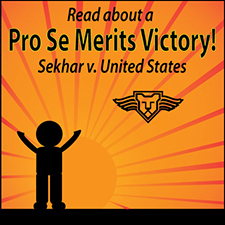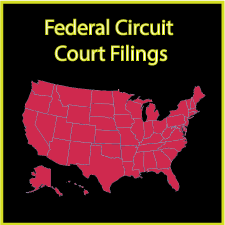Verhagen et al. v. State of Wisconsin (December 2013)
The Supreme Court Press “Petition of the Month”TM for December 2013 is Kimberly Verhagen, Christopher J. Nickels, Craig M. Van Asten & James Bell v. State of Wisconsin. Supreme Court Dkt. No. 13-545, an appeal coming out of the Wisconsin Supreme Court. The petition was filed by John Miller Carroll of the John Miller Carroll Law Office of Appleton, Wisconsin.
Question Presented:
Is Wisconsin’s unique operating while intoxicated statute unconstitutional in that it directs courts to count civil judgments as “convictions” for OWI penalty enhancement purposes, without properly submitting the civil judgments to first be proven beyond a reasonable doubt to a jury as required by Apprendi v. New Jersey, 530 U.S. 466, 120 S. Ct. 2348 (2000)?
The Supreme Court set off a major change in criminal sentencing with its 2000 ruling in Apprendi v. New Jersey, 530 U.S. 466, 120 S. Ct. 2348 (2000), which required that any fact that increased the penalty for a crime beyond the prescribed statutory maximum is, in effect, an element of the crime, which must be submitted to a jury and proven beyond a reasonable doubt. But the decision was sharply debated, and subsequent splintered decisions in Harris v. United States, 536 U.S. 545, 122 S.Ct. 2406 (2002) (holding that so long as the maximum sentence is not exceeded, Apprendi need not apply) and Alleyne v. United States, (No. 11--9935, June 17, 2013) (any fact that then leads to the imposition of a mandatory minimum must meet the Apprendi standard). Now out of Wisconsin comes a fascinating case. Wisconsin is the only state in the country to treat a first time OWI/DUI as a civil judgment. At a first-timer hearing, a defendant is not permitted the right to counsel, the right to confront witnesses, the right against self-incrimination, and the right to have a unanimous jury verdict. The standard of proof is also lower - clear, satisfactory, and convincing. The teeth rear themselves on a second offense, where Wisconsin judges apply a major penalty enhancement, essentially treating the second OWI/DUI as a second criminal conviction. The Verhagen case posits whether it is constitutional to enhance a sentence on an alleged second-offense when the first offense was not submitted to a jury and lacked basic constitutional protections. |
 Almost every 2nd offense OWI is predicated upon a civil conviction in which defendants are not afforded the same constitutional rights as the defendants would in a criminal trial.
- John Miller Carroll
Almost every 2nd offense OWI is predicated upon a civil conviction in which defendants are not afforded the same constitutional rights as the defendants would in a criminal trial.
- John Miller Carroll| Mr. Carroll, thank you for sharing your thoughts on the Verhagen petition. But first I have to congratulate your Boston Red Sox on winning the World Series. You were in the thick of filing this petition while the series was in progress.. | |
Thank you very much. They won the same day the case was docketed on October 31st. What an outstanding team effort that was! |
|
| Why is the Verhagen et al. case important to you? | |
I do believe this case has broader implications. The issue raised in this appeal is one encountered regularly in the State of Wisconsin. Almost every 2nd offense OWI is predicated upon a civil conviction in which defendants are not afforded the same constitutional rights as the defendants would in a criminal trial. I also believe that Wisconsin’s drinking culture overlooks the seriousness of operating while intoxicated offenses by treating them similarly to parking tickets. Many believe that this first ticket will convince people to refrain from this behavior in the future, but it is clear this approach is not working. |
|
| How did you make the intellectual connection between Apprendi and the Wisconsin OUI statute? | |
This situation is analogous to juvenile cases I have previously handled in which Apprendi was applied. In both juvenile and civil court a defendant is not guaranteed each of his or her constitutional rights. The lack of due process causes one to question the validity of these convictions and their subsequent use as enhancers in future criminal matters. |
|
It’s so unusual for one attorney to have multiple cases in a state, then combining them to press a constitutional issue. How did you develop this strategy? |
|
I have handled consolidate appeals in the past. When one handles many cases which present the same issue it just makes more sense to raise the issue in one consolidated appeal. |
|
Have other OWI attorneys in Wisconsin followed your lead? Is there a coordinated effort to raise the profile of this issue? |
|
A few attorneys in Wisconsin have followed my lead and raised the same issue. There has not been a coordinated effort to raise the profile of this issue. Presumably, because the trial courts have been reluctant to take responsibility to rule in our favor due to the resistance of the legislature to change the law. |

Has this matter carried over into the Wisconsin legislature? What changes to the law might be in store? |
|
This matter is often raised in Wisconsin legislature, and often met with resistance from lobby groups such as the Tavern League. There are currently many bills pending to amend Wisconsin’s drunk driving laws that have been introduced by Representative Jim Ott and Senator Alberta Darling. Two that are of significance to this issue are Senate Bill 57/Assembly Bill 67 which if enacted would require first time offenders to appear in court, and Senate Bill 58/Assembly Bill 68 which would make first offenses criminal if the suspects blood alcohol level was greater than 0.15. Although many people do not believe in stricter drunk driving laws, I agree with Alberta Darling who according to USA Today recently stated: “Creating deterrents for first-time offenders is key. In other states, ‘there’s much more of a stigma on a first offense, so people are very afraid to get caught,' she says. ‘When you’re sitting in a bar with friends having a good time, you often don’t see the tragic flip side.'” |
|
Your firm also handles a lot of drug cases. Has Apprendi had any impact on sentencing in Wisconsin drug cases? |
|
Wisconsin handles drug cases much differently than OWI cases. For example, if an individual received a citation (ordinance violation) for possessing THC this citation would not be used to enhance a subsequent THC charge. The only way a possession charge is used to enhance a subsequent offense, making it a felony, is if the previous charge was a criminal misdemeanor conviction. |
|
| Do you have any final thoughts to share? | |
Our experience with Supreme Court Press has been excellent. Someone has always been available for even the most trivial questions. We received practical tips and great advice that I believe assisted in our efforts to get certiorari. Supreme Court Press never presented the company as merely a printer. Supreme Court Press has provided us with a place to go for all of our needs relating to this petition. |
 Our experience with Supreme Court Press has been excellent. Someone has always been available for even the most trivial questions. We received practical tips and great advice that I believe assisted in our efforts to get certiorari. Supreme Court Press never presented the company as merely a printer. Supreme Court Press has provided us with a place to go for all of our needs relating to this petition. - John Miller Carroll
Our experience with Supreme Court Press has been excellent. Someone has always been available for even the most trivial questions. We received practical tips and great advice that I believe assisted in our efforts to get certiorari. Supreme Court Press never presented the company as merely a printer. Supreme Court Press has provided us with a place to go for all of our needs relating to this petition. - John Miller Carroll


---Bryan-Krumm.png)
---ZoeSpencer.png)


